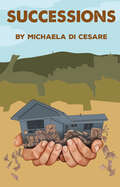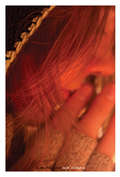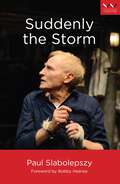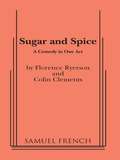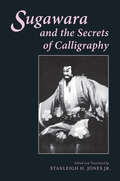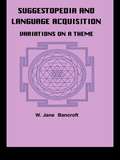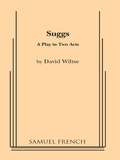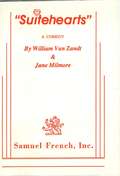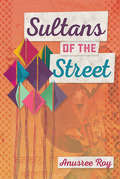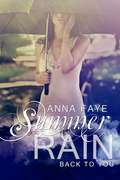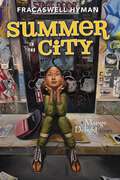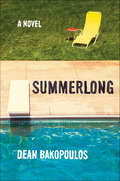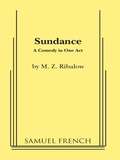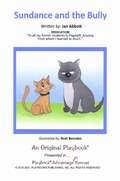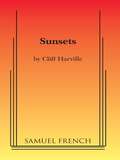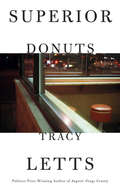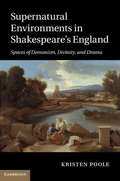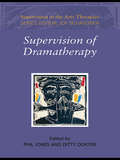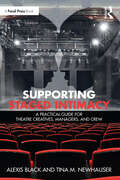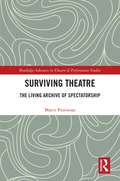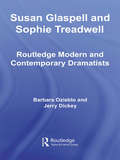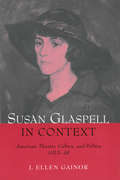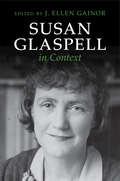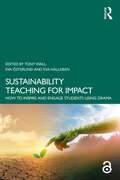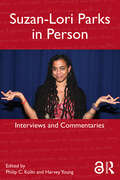- Table View
- List View
Successions
by Michaela Di CesareAfter the unexpected death of their parents, two second-generation Italian Canadian brothers must come together to decide whether to hold on to the family home, which is full of secrets and hoarded junk, or save what’s left of their strained relationship. When Anthony, an uptight lawyer running for office, arrives with his former actor-turned-campaign-manager wife Cristina, they’re set on signing away the house and everything that comes with it. But Enzo, a disorganized plumber, and his pregnant girlfriend Nat have other plans. The pleasantries quickly turn to tense deliberations that unearth dramatically differing views of the group’s past experiences and present values. This clever family dramedy takes a close look at issues that affect modern second-generation immigrant families in Canada—class differences, antiquated old-world beliefs, and a crumbling Canadian dream.
Such Creatures
by Judith ThompsonTwo characters and two monologues, tied together across time and place, their stories a candid pursuit of hope and empathy, even in the face of an unbelievably cruel world. Judith Thompson's Such Creatures portrays her raw style of storytelling and showcases her incessant quest to understand the dark, neglected, and troubling corners of society. Both unbelievably cruel and unbelievably human, Such Creatures is an awe-inspiring portrayal of the breadth of the human spirit.
Suddenly the Storm: A play
by Paul SlabolepszyA smouldering dark comedy that suddenly leads to startling revelations, rage and recrimination. Combative, volatile, constantly on the verge of exploding, Dwayne and Shanell Combrink are two halves of a white South African working-class couple, living an uneasy truce as they struggle with the day-to-day trials of scraping together a living and dreaming competing dreams. But beneath Dwayne's angry, violent exterior lies the heartbreak that governs his attitude to life. Dwayne is a man in mourning. Shanell believes his current level of despair was sparked by the death of his childhood friend and recent work partner, Jonas, but the source of his mourning and anger lies much further back. When the elegant and self-contained Namhla Gumede, born on 16 June 1976, arrives on their doorstep seeking answers to questions that have remained buried for 40 years, Dwayne and Shanell finally find out the truth. What starts as a smouldering dark comedy suddenly turns into a roller-coaster ride of startling revelations, rage and recrimination, before the storm finally breaks.
Sugar & Spice
by Florence RyersonComedy / 2m, 3f / Interior / Jane Jones, almost sixteen, is visited by a young friend who has just returned from Paris with a boy complex and some acquired mannerisms which infuriate Jane. When the friend takes Jane's boyfriend, Chump Edwards, right out from under her nose, Jane is roused to a realization of Chump's worth and takes him back again. She also learns a great truth-- that more boys are caught with sugar than with vinegar.
Sugawara and the Secrets of Calligraphy (Translations from the Asian Classics)
by Stanleigh Jones Jr.Sugawara and the Secrets of Calligraphy is a classic play from Japan's golden age of puppet theater. Written in the eighteenth century, it tells the tale of Sugawara no Michizane, a wronged scholar-official who, in death, joins the Shinto pantheon as a nurturer of scholarship and calligraphy. The story recounts Sugawara's entanglement with the powerful Fujiwara family, who accuse Sugawara of plotting against the emperor, resulting in his exile and death in 903. After a series of misfortunes befall those who conspired against him, Sugawara's enemies appease his spirit through deification. Sugawara and the Secrets of Calligraphy centers on three archetypical brothers and their wives. Their fates unfold against the intrigues surrounding Sugawara and his foes, which reflect the cultural values of the Edo period woven into a stylized past. This annotated translation by Stanleigh H. Jones Jr. replicates the play's poetic and idiomatic language and its original mix of register while also clarifying the drama's complex story and dialogue for students of Japanese literature and drama. An introduction situates the play within its eighteenth-century context and ninth-century setting and describes the relationship between bunraku puppet theater and kabuki. A unique illustrated appendix delves into the construction of puppets and the art of puppetry.
Suggestopedia and Language
by W. Jane BancroftFirst published in 1999. Routledge is an imprint of Taylor & Francis, an informa company.
Suggs
by David WiltseFull Length, Drama / 4 m, 4 f / Int. / George Suggs, a bright, energentic young man, comes to the city to work as a sportscaster. He is fascinated but then repelled by the ugly realities he finds there, making him cynical and bitter. His career suffers, the wife he should never have married leaves him and he loses his mundane job. Dissolute and paranoid, making one last attempt to connect on a human level he employs a prostitute for company. Premiered at New York's Lincoln Center Theatre. / "Wry, funny sad, sharply observed, perceptive." -N.Y. Times
Suitehearts
by Jane Milmore Billy Van ZandtComedy / 3m, 2f / Interior / A young couple from Pennsylvania checks into a posh New York hotel to fill their weekend with bliss, only to have it filled with strangers. Timothy and his wife have inadvertently booked the same honeymoon suite as Frankie and Wanda, an older couple from New Jersey. After they scuffle over the accommodations, no one is where or with whom they should be. Filled with sight gags and one liners, this play broke the house records at New Jersey's Dam Site Dinner Theater. During the course of the evening, Timothy grows into a man, Elizabeth learns about trust, Frankie learns to respect women and Wanda learns to respect herself.
Sultans of the Street
by Anusree RoyWhen young orphans Mala and Chun Chun encounter brothers Prakash and Ojha on the busy streets of Kolkata, they are immediately at odds. The brothers come from a lower-middle-class family and spend their time flying kites instead of attending class, while Mala and Chun Chun can only dream of going to school, a goal Aunty promises will be fulfilled if they beg for money from passersby. After a petty fruit-stall heist lands Ojha in Aunty’s cunning hands, the brothers are blackmailed into begging alongside Mala and Chun Chun, forcing the children to interact. Though they find each other nuisances at first, the kids soon realize their strength in numbers as Aunty’s scheming is slowly revealed.
Summer Rain - Back to you
by Charlotte Forsdick Anna Winter / Anna FayeThe young Skyler Montrose turned her back on her hometown Bozeman years ago. Back then a scandal had shaken the sleepy Montana town. A scandal in which Skyler’s family was involved. But the events of the past still cast their shadows on another person: Mark Chastain. The one time star quarterback has become a successful businessman. When Skyler returns to Bozeman it is not only the old secrets of a youthful indiscretion that boil up again, but also a few old unrequited feelings.
Summer in the City (Mango Delight #2)
by Fracaswell HymanGet ready, world—Mango&’s about to become a STAR! In this sequel to Mango Delight, the delightful heroine&’s adventures—and misadventures—continue as she prepares to make her off-Broadway debut. Where Mango goes, drama is sure to follow! It&’s summer break, and Mango is content to spend her time babysitting her brother, hanging with her friend Izzy, and binge-watching movies late into the night. Then she runs into her drama teacher, who has some big news: their middle school play Yo, Romeo! is headed to the stage in New York City . . . and he wants Mango for the lead role! After overcoming her mom&’s initial reluctance—and with some firm rules established—Mango goes off to Brooklyn to stay with her Aunt Zendaya in a teeny apartment and prepare for her theatrical debut. It&’s the opportunity of a lifetime, but soon Mango must confront homesickness, insecurity, and the all-important question of what it means to be a good friend—especially when you&’re far away from the people you love.
Summerlong: A Novel
by Dean BakopoulosThe author of Please Don’t Come Back from the Moon and My American Unhappiness delivers his breakout novel: a deft and hilarious exploration of the simmering tensions beneath the surface of a contented marriage which explode in the bedrooms and backyards of a small town over the course of a long, hot summer.In the sweltering heat of one summer in a small Midwestern town, Claire and Don Lowry discover that married life isn’t quite as they’d predicted.One night Don, a father of three, leaves his house for an evening stroll, only to wake up the next morning stoned, and sleeping in a hammock next to a young woman he barely knows. His wife, Claire, leaves the house on this same night to go on a midnight run—only to find herself bumming cigarettes and beer outside the all-night convenience store.As the summer lingers and the temperature rises, this quotidian town’s adults grow wilder and more reckless while their children grow increasingly confused. Claire, Don, and their neighbors and friends find themselves on an existential odyssey, exploring the most puzzling quandaries of marriage and maturity. When does a fantasy become infidelity? When does compromise become resentment? When does routine become boring monotony? Can Claire and Don survive everything that befalls them in this one summer, forgive their mistakes, and begin again?Award-winning writer Dean Bakopoulos delivers a brutally honest and incredibly funny novel about the strange and tenuous ties that bind us, and the strange and unlikely places we find connection. Full of mirth, melancholy, and redemption, Summerlong explores what happens when life goes awry.
Sundance
by Meir Z. RibalowComedy / 5 m. / Simple int. / Takes place in a sort of metaphysical wild west saloon. The characters include Hickock, Jesse, the Kid and the inevitable Barkeep. Hickock kills to uphold the law. Jesse kills for pleasure. The Kid kills to bring down The Establishment. What if, wonders the Barkeep, they met up with the Ultimate Killer-- who kills for no reason, who kills simply because that's what he does? Enter Sundance. He does not kill to uphold the law, for pleasure, or to make a political statement, or because he had a deprived childhood. He kills for no reason at all. And he proceeds to kill everyone, exiting at the end with his sixguns blazing! / "Witty, strong, precise, unusually well written."-- Guardian. / This co winner of the 1981 Annual NYC Metropolitan Short Play Festival has been a success in 6 countries!
Sundance and the Bully
by Jan AbbottWelcome to the world of Playbooks® and the beginning of a wonderful role-play reading adventure! Playbooks® stories are presented in a unique and colorful format and are read out loud by several readers like a play, without memorization, props, or a stage. <p><p>When you read a Playbook®, you and other readers bring the story to life and become the characters. As you read your part out loud, you will have fun expressing and acting like your character. You and the other readers will explore the story plot together and learn what will happen next. It's an exciting journey of discovery that pulls you into the story, and you'll want to read it out loud again and again!
Sunsets
by Cliff HarvilleThis collection consists of four short plays: George L. Smith (Monologue / 1m), A Silent Catastrophe (One Act / 1m, 1f / Interior), Sara Hubbard (Monologue / 1f), and Hang Me My Afghan (One Act / 1m, 1f / Interior)
Superior Donuts
by Tracy Letts"It is a meditation on Chicago's old soul . . . a witty, seductive, live-wire and greatly entertaining dark comedy that you just don't want to end." -Chicago Tribune"The sting, the speed and marksmanship of the gimcracks his characters fire at each other . . . drips the kind of soulful, energized sarcasm that has long characterized [Letts'] work as an actor and playwright."-Time Out Chicago Tracy Letts, who won the 2008 Pulitzer Prize for his epic, caustic Oklahoma family drama August: Osage County, has shifted gears with this entertaining comedy set in a donut shop. A love letter to the city where he has lived for more than twenty years, Letts describes his new work as "an exploration of the Chicago storefront experience." The play takes place in the north side neighborhood of Uptown, where Arthur Przybyszewski runs the donut shop that has been in his family for sixty years. More content to spend the day smoking weed and reminiscing about his Polish immigrant father, Arthur hires a shop assistant, the young African American Franco Wicks, who has both an unpublished novel and unpaid gambling debt. Superior Donuts premiered at Steppenwolf Theatre Company and recently opened on Broadway--following the same path of success as Letts' previous work.Tracy Letts is the author of Killer Joe, Bug, Man from Nebraska (nominated for the 2004 Pulitzer Prize), and August: Osage County (awarded the 2008 Pulitzer Prize for Drama). He is a member of Chicago's Steppenwolf Theatre Company.
Supernatural Environments in Shakespeare's England: Spaces of Demonism, Divinity, and Drama
by Kristen PooleBringing together recent scholarship on religion and the spatial imagination, Kristen Poole examines how changing religious beliefs and transforming conceptions of space were mutually informative in the decades around 1600. Supernatural Environments in Shakespeare's England explores a series of cultural spaces that focused attention on interactions between the human and the demonic or divine: the deathbed, purgatory, demonic contracts and their spatial surround, Reformation cosmologies and a landscape newly subject to cartographic surveying. It examines the seemingly incongruous coexistence of traditional religious beliefs and new mathematical, geometrical ways of perceiving the environment. Arguing that the late sixteenth- and early seventeenth-century stage dramatized the phenomenological tension that resulted from this uneasy confluence, this groundbreaking study considers the complex nature of supernatural environments in Marlowe's Doctor Faustus and Shakespeare's Othello, Hamlet, Macbeth and The Tempest.
Supervision of Dramatherapy (Supervision in the Arts Therapies)
by Phil Jones Ditty DokterSupervision of Dramatherapy offers a thorough overview of dramatherapy supervision and the issues that can arise during the supervisory task. Phil Jones and Ditty Dokter bring together experts from the field to examine supervision in a range of contexts with different client groups, including dramatherapy with children, forensic work, and intercultural practice. Each chapter features: theoretical grounding the importance of action methods position in the professional lifecycle application in relation to setting and client groups. Using illustrative examples, Supervision of Dramatherapy provides practical guidance and theoretical grounding, appealing to supervisors and supervisees alike, as well as psychotherapists interested in the use of dramatic methods in the supervisory setting.
Supporting Staged Intimacy: A Practical Guide for Theatre Creatives, Managers, and Crew
by Alexis Black Tina M. NewhauserSupporting Staged Intimacy: A Practical Guide for Theatre Creatives, Managers, and Crew examines the relationship between staged intimacy, intimacy direction, and those supporting the process during pre-production, rehearsal, and performance. First, this book addresses challenges and trends in staging intimacy, helping backstage and offstage theatre artists recognize the problematic approaches and culture that led to the emerging field of intimacy direction. This text will then provide tools and recommended practices for supporting the creation and maintaining of staged intimacy, enabling team members to enact contemporary protocols concerning advocacy and agency. Finally, this book will educate and empower readers with the necessary skills to prompt change; by providing modern techniques, essential workplace protocols, and achievable action items, this book will transform the way theatre designers, managers, crew, and other creative team members engage with theatrical consent. Supporting Staged Intimacy is written for every pre-professional and professional artist working behind the scenes who wish to better support consensual workplaces, physically intimate stories, and the individuals telling those stories.
Surviving Theatre: The Living Archive of Spectatorship (Routledge Advances in Theatre & Performance Studies)
by Marco PustianazWritten soon before and in the middle of the Covid-19 pandemic when theatre ground to a halt and spectatorship was suspended, this book takes stock of spectatorship as theatre’s living archive and affirms its value in the midst of the present crisis. Drawing from a manifold affective archive of performances and installations by Marina Abramović, Ron Athey, Forced Entertainment, Socìetas Raffaello Sanzio, Blast Theory, LIGNA, Doris Salcedo, Graeme Miller, Lenz Rifrazioni, Cristina Rizzo ..., and expanding on the work of many theorists and scholars like Roland Barthes and Jacques Rancière, Giorgio Agamben and Alain Badiou, Nicholas Ridout and Alan Read, among others, the book focuses on the spectator as the subject, rather than the object, of investigation. This is the right time to remember their secret power and theorise their collective time in the theatre. This book is an archive of their adventure and a manifesto rooted in their potentiality. It boldly posits the spectator as the inaugurator of theatre, the surplus that survives it. The book will be of great interest to spectators all and sundry, to scholars and students of theatre and performance studies, of spectatorship and politics.
Susan Glaspell and Sophie Treadwell (Routledge Modern and Contemporary Dramatists)
by Barbara Ozieblo Jerry DickeySusan Glaspell and Sophie Treadwell presents critical introductions to two of the most significant American dramatists of the early twentieth century. Glaspell and Treadwell led American Theatre from outdated melodrama to the experimentation of great European playwrights like Ibsen, Strindberg and Shaw. This is the first book to deal with Glaspell and Treadwell’s plays from a theatrical, rather than literary, perspective, and presents a comprehensive overview of their work from lesser known plays to seminal productions of Trifles and Machinal. Although each woman pursued her own themes, subjects and manner of stage production, this shared volume underscores the theatrical and cultural conditions influencing female playwrights in modern America.
Susan Glaspell in Context
by J. Ellen GainorSusan Glaspell in Context not only discusses the dramatic work of this key American author -- perhaps best known for her short story "A Jury of Her Peers" and its dramatic counterpart,Trifles-- but also places it within the theatrical, cultural, political, social, historical, and biographical climates in which Glaspell's dramas were created: the worlds of Greenwich Village and Provincetown bohemia, of the American frontier, and of American modernism. J. Ellen Gainor is Professor of Theatre, Women's Studies, and American Studies, Cornell University. Her other books include Performing America: Cultural Nationalism in American Theater (co-edited with Jeffrey D. Mason) from the University of Michigan Press.
Susan Glaspell in Context (Literature in Context)
by J. Ellen GainorSusan Glaspell in Context provides new, accessible, and informative essays by leading international scholars and artists on Pulitzer Prize winner Susan Glaspell's life, career development, writing, and ongoing global creative impact. The collection features wide-ranging discussions of Glaspell's fiction, plays, and non-fiction in both historical and contemporary critical contexts, and demonstrates the significance of Glaspell's writing and other professional activities to a range of academic disciplines and artistic engagements. The volume also includes the first analyses of six previously unknown Glaspell short stories, as well as interviews with contemporary stage and film artists who have produced Glaspell's works or adapted them for audiences worldwide. Organized around key locations, influences, and phases in Glaspell's career, as well as core methodological and pedagogical approaches to her work, the collection's thirty-one essays place Glaspell in historical, geographical, political, cultural, and creative contexts of value to students, scholars, teachers, and artists alike.
Sustainability Teaching for Impact: How to Inspire and Engage Students Using Drama
by Tony Wall Eva Österlind Eva HallgrenSustainability Teaching for Impact is an essential step-by-step, practical guide for those wanting to inspire and engage higher education students in the areas of sustainability.This book encourages new and experienced university teachers across disciplines to adopt and adapt dramatic methods, with a view to develop their teaching. It introduces applied drama and performance arts methods that have been tried-and-tested across disciplines to deepen and broaden sustainability knowledge, skills, mindsets, and practices. Sustainability Teaching for Impact assumes no previous experience of the methods, as university teachers – with and without experience in drama – carefully walk you through some of the teaching practices they have used to create an impact in their teaching.This book is for higher and further education tutors who wish to build on their experience and deliver exciting and accessible classroom techniques and practices that are highly interactive, creative, and engaging to help further the teaching of sustainability.The Open Access version of this book, available at www.taylorfrancis.com, has been made available under a Creative Commons Creative Commons Attribution (CC-BY) 4.0 license.
Suzan-Lori Parks in Person: Interviews and Commentaries
by Philip C. Kolin Harvey YoungThis collection of interviews offers unprecedented insight into the plays and creative works of Suzan-Lori Parks, as well as being an important commentary on contemporary theater and playwriting, from jazz and opera to politics and cultural memory. Suzan-Lori Parks in Person contains 18 interviews, some previously untranscribed or specially undertaken for this book, plus commentaries on her work by major directors and critics, including Liz Diamond, Richard Foreman, Bonnie Metzgar and Beth Schachter. These contributions combine to honor the first African American woman to receive the Pulitzer Prize in drama, and explore her ideas about theater, history, race, and gender. Material from a wide range of sources chronologically charts Parks’s career from the 1990s to the present. This is a major collection with immediate relevance to students of American/African-American theater, literature and culture. Parks’s engaging voice is brought to the fore, making the book essential for undergraduates as well as scholars.
